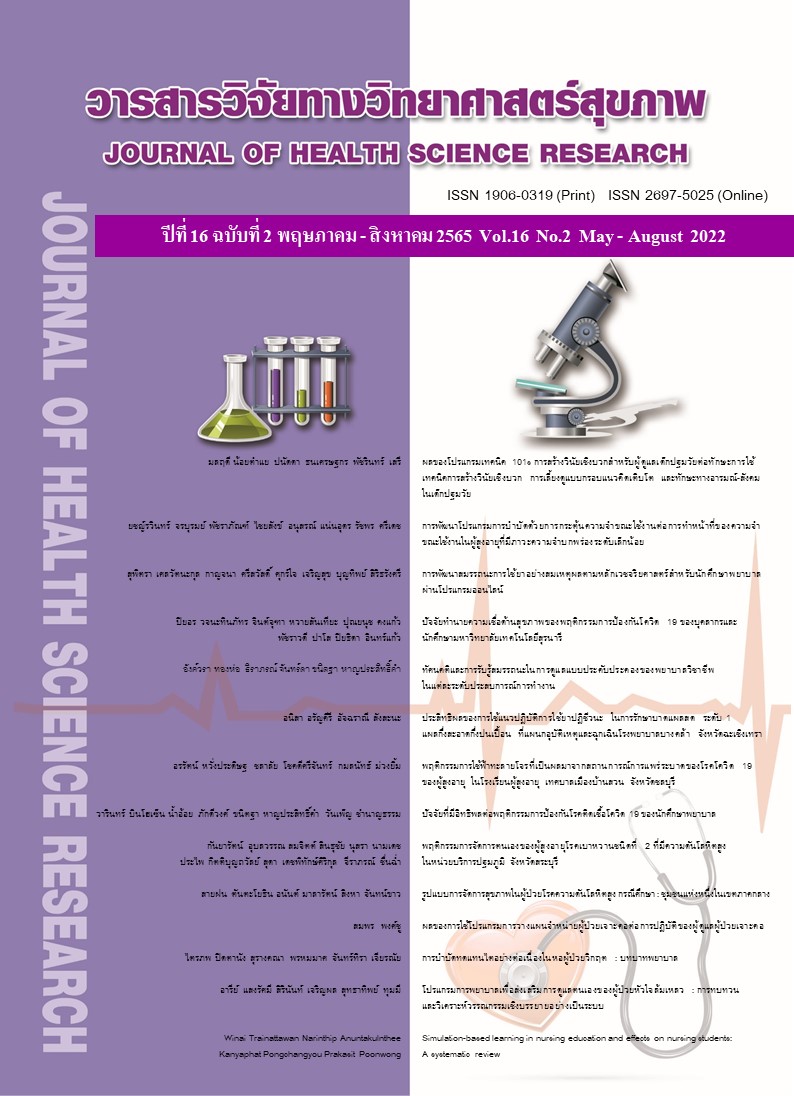โปรแกรมการพยาบาลเพื่อส่งเสริมการดูแลตนเองของผู้ป่วยหัวใจล้มเหลว: การทบทวนและวิเคราะห์วรรณกรรมเชิงบรรยายอย่างเป็นระบบ
Main Article Content
บทคัดย่อ
ในปัจจุบันผู้ป่วยโรคหัวใจล้มเหลวมีจำนวนเพิ่มสูงขึ้นและเป็นสาเหตุการเสียชีวิต การดูแลตนเองเป็นสิ่งสำคัญที่ช่วยให้ผู้ป่วยหัวใจล้มเหลวสามารถควบคุมอาการและป้องกันการกำเริบของโรค และการจัดการอาการที่เกิดขึ้น ทำให้การเสียชีวิตลดลงและมีคุณภาพชีวิตที่ดี การศึกษาครั้งนี้มีวัตถุประสงค์เพื่อทบทวน วิเคราะห์และสังเคราะห์งานวิจัยโปรแกรมการพยาบาลเพื่อส่งเสริมการดูแลตนเองของผู้ป่วยหัวใจล้มเหลว และวิเคราะห์วิธีการส่งเสริมการดูแลตนเองเพื่อพัฒนาโปรแกรมการส่งเสริมการดูแลตนเองของผู้ป่วยหัวใจล้มเหลวในประเทศไทย โดยศึกษาจากงานวิจัยที่มีการประเมินการดูแลตนเอง มีการเผยแพร่ระหว่างปี ค.ศ. 2010-2020 จำนวน 20 เรื่อง การวิเคราะห์ข้อมูลโดยวิเคราะห์เนื้อหาเชิงบรรยายและการจัดกลุ่มตามทฤษฎีเฉพาะเจาะจงการดูแลตนเองหัวใจล้มเหลว ผลการวิเคราะห์พบว่า โปรแกรมการส่งเสริมการดูแลตนเองของผู้ป่วยหัวใจล้มเหลว ส่วนใหญ่เกี่ยวข้องกับองค์ประกอบการดูแลตนเองด้านการรักษาสุขภาพมากกว่าการดูแลตนเองด้านการจัดการอาการ และความมั่นใจในการดูแล วิธีการส่งเสริมการดูแลตนเองของผู้ป่วยหัวใจล้มเหลวมีหลากหลาย ข้อเสนอแนะที่ได้จากผลการวิจัยครั้งนี้ในการพัฒนาโปรแกรมส่งเสริมการดูแลตนเองของผู้ป่วยหัวใจล้มเหลว ต้องมีกิจกรรมเกี่ยวกับการดูแลตนเองครบทั้ง 3 องค์ประกอบ ด้านการรักษาสุขภาพ การจัดการอาการ และความมั่นใจในการดูแล วิธีส่งเสริมการดูแลตนเองต้องใช้การผสมผสาน โดยมีองค์ประกอบการดูแลตนเองด้านการรักษาสุขภาพเป็นพื้นฐานอันแรก โดยเน้นให้ความรู้เกี่ยวกับโรคและการปฏิบัติตัว การสอนควรเป็นรายบุคคลตามความพร้อมและสภาวะของผู้ป่วย ใช้หลักจิตวิทยาสร้างแรงจูงใจ ระยะเวลาการดำเนินโปรแกรมและการใช้สื่ออย่างเหมาะสม รวมถึงการดูแลแบบสหวิชาชีพ
Downloads
Article Details

อนุญาตภายใต้เงื่อนไข Creative Commons Attribution-NonCommercial-NoDerivatives 4.0 International License.
บทความที่ได้รับการตีพิมพ์เป็นลิขสิทธิ์ของวิทยาลัยพยาบาลบรมราชชนนี จังหวัดนนทบุรี
ข้อความที่ปรากฏในบทความแต่ละเรื่องในวารสารวิชาการเล่มนี้เป็นความคิดเห็นส่วนตัวของผู้เขียนแต่ละท่านไม่เกี่ยวข้องกับวิทยาลัยพยาบาลบรมราชชนนี จังหวัดนนทบุรี และคณาจารย์ท่านอื่น ในวิทยาลัยฯ แต่อย่างใด ความรับผิดชอบองค์ประกอบทั้งหมดของบทความแต่ละเรื่องเป็นของผู้เขียนแต่ละท่าน หากมีความผิดพลาดใด ๆ ผู้เขียนแต่ละท่านจะรับผิดชอบบทความของตนเองแต่ผู้เดียว
เอกสารอ้างอิง
National Statistical Office. Health statistics. [internet]. 2020 [cited 2022 Jul 9]; Available from: http://statbbi.nso.go.th/staticreport/page/ sector/en/05.aspx. (in Thai).
Reyes EB, Ha J, Firdaus I, Ghazi AM, Phrommintikul A, Sim D, et al. Heart failure across Asia: Same healthcare burden but differences in organization of care. Int J Cardiol. 2016;223;163-67. doi: 10.1016/j.ijcard.2016.07.256.
Rigel B, Dickson VV. A situation-specific theory of heart failure self-care. J Cardiovasc Nurs. 2008;23(3):190-96. doi: 10.1097/01.JCN.000 0305091.35259.85.
Koirala B, Dennison Himmelfarb CR, Budhathoki C, Davidson PM. Heart failure self-care, factors influencing self-care and the relationship with health-related quality of life: A cross-sectional observational study. Heliyon. 2020;6(2):e03412. doi: 10.1016/j.heliyon.2020. e03412.
Moher D, Liberati A, Tetzlaff J, Altman DG, The PRISMA Group. Preferred reporting items for systematic reviews and meta-analyses: The PRISMA Statement. PLoS Med. 2009;6(7): e1000097. doi: 10.1371/journal.pmed.100 0097.
Armijo-Olivo S, Stiles CR, Hagen NA, Biondo PD, Cummings GG. Assessment of study quality for systematic reviews: a comparison of the Cochrane collaboration risk of bias tool and the effective public health practice project quality assessment tool: methodological research. J Eval Clin Pract. 2012;18(1):12-8. doi: 10.1111/ j.1365-2753.2010.01516.x.
Arruda CS, Pereira JMV, Figueiredo LDS, Scofano BDS, Flores PVP, Cavalcanti ACD. Effect of an orientation group for patients with chronic heart failure: randomized controlled trial. Rev Lat Am Enfermagem. 2017;25: e2982. doi: 10.1590/1518-8345.2167.2982.
Athar MW, Record JD, Martire C, Hellmann DB, Ziegelstein RC. The effect of a personalized approach to patient education on heart failure self-management. J Pers Med. 2018;8(4):39. doi: 10.3390/jpm8040039.
El-Badawy AM, EI Hefnawy KA. Randomized controlled trial of comprehensive nursing intervention on readmission, mortality and quality of life among Egyptian heart failure patients: A 12 month follow up study. J Nurs Educ Pract. 2012.3(5):14-30. doi: 10.5430/jnep. v3n5p14.
Bertuzzi D, Souza EN, Moraes MA, Mussi C, Rabelo ER. The knowledge of patients with heart failure in the homecare context: an experimental study. Online braz j nurs. 2012; 11(3):572-82.
Chen J, Zhao H, Hao S, Xie J, Ouyang Y, Zhao S. Motivational interviewing to improve the self-care behaviors for patients with chronic heart failure: A randomized controlled trial. Int J Nurs Sci. 2018.;5(3):213–7. doi: 10.1016/j.ijnss.201 8.04.012.
Domingues FB, Clausell N, Aliti GB, Dominguez DR, Rabelo ER. Education and telephone monitoring by nurses of patients with heart failure: randomized clinical trial. Arq Bras Cardiol. 2011;96(3):233-9. doi: 10.1590/s0066-782x2011005000014.
Mahmoud AEN, Mustafa KS, Zaki S. Effect of nursing teaching program on awareness and adherence among patients with chronic heart failure disease. Egypt. J. Health Care 2017; 8(3):195-207. doi: 10.21608/ejhc.2017.47307.
Evangelista LS, Liao S, Motie M, De Michelis N, Lombardo D. On-going palliative care enhances perceived control and patient activation and reduces symptom distress in patients with symptomatic heart failure: a pilot study. Eur J Cardiovasc Nurs. 2014;13(2):116-23. doi: 10.1177/1474515114520766.
Gheiasi SF, Roohani M, Hanifi N, Kamali K.. The Impact of a training program based on learning needs on self-care behaviors among patients with heart failure. Evid. Based Care J. 2017;7(1):15-24. doi: 10.22038/EBCJ.2017.21040.1487.
Hale TM, Jethwani K, Kandola MS, Saldana F, Kvedar JC. A remote medication monitoring system for chronic heart failure patients to reduce readmissions: A two-arm randomized pilot study. J Med Internet Res. 2016;18(5):e91. doi: 10.2196/jmir.5256.
Hawkins SY, Thomason TR, Steen C, Glaser D. A multimodal technology intervention for heart failure patients to reduce readmissions. Clin Nurs Stud. 2015;4(1):6-15. doi: 10.5430/cns.v4n1p6.
Kaveh M, Khoramaki Z, Kojouri J, Keshavari S. The impact of a hospital-based educational program based on the health belief model on self-care behaviors of heart failure patients. Iran Red Crescent Med J. 2016;19(1):1-7:e36676. doi: 10.5812/ircmj.36676.
Liou H, Chen H, Hsu S, Lee S, Change C, Wu M. The effects of a self-care program on patients with heart failure. J Chin Med Assoc. 2015; 78(11):648-656. doi: 10.1016/j.jcma.2015.06.004.
Mantovani VM, Ruschel KB, Souza EN, Muss C, Rabelo-Silva ER. Treatment adherence in patients with heart failure receiving nurse-assisted home visits. ACTA Paul Enferm. 2015; 28(1):41-7. doi: 10.1590/1982-0194201500008.
Mizukawa M, Moriyama M, Yamamoto H, Rahman MM, Naka M, Kitagawa T, et al. Nurse-Led collaborative management using telemonitoring improves quality of life and prevention of rehospitalization in patients with heart failure. Int Heart J. 2019;60(6):1293-302. doi: 10.1536/ihj.19-313.
Mussi CM, Ruschel K, de Souza EN, Lopes AN, Trojahn MM, Paraboni CC, et al. Home visit improves knowledge, self-care and adhesion in heart failure: Randomized Clinical Trial HELEN-I. Rev Lat Am Enfermagem. 2013;21 Spec:20-8. doi: 10.1590/s0104-11692013000700004.
Oliveira JA, Cordeiro RG, Rocha RG, Guimarães TCF, Albuquerque DC. Impact of telephone monitoring on patients with heart failure: a randomized clinical trial. Acta Paul Enferm. 2017;30(4):333-42. doi: 10.1590/1982-0194201700050.
Sezgin D, Mert H, Özpelit E, Akdeniz B. The effect on patient outcomes of a nursing care and follow-up program for patients with heart failure: A randomized controlled trial. Int J Nurs Stud. 2017;70:17-26. doi: 10.1016/j.ijnurstu.2017.02.013.
Sun J, Zhang ZW, Ma YX, Liu W, Wang CY. Application of self-care based on full course individualized health education in patients with chronic heart failure and its influencing factors. World J Clin Cases. 2019;7(16):2165-75. doi: 10.12998/wjcc.v7.i16.2165.
Tung HH, Lin CY, Chen KY, Chang CJ, Lin YP, Chou CH. Self-management intervention to improve self-care and quality of life in heart failure patients. Congest Heart Fail. 2013;19(4):E9-16. doi: 10.1111/chf.12014.
da Conceição AP, dos Santos MA, dos Santos B, da Cruz Dde A. Self-care in heart failure patients. Rev Lat Am Enfermagem. 2015;23(4):578–86. doi: 10.1590/0104-1169.0288.2591.
Zavertnik JE. Self-care in older adults with heart failure: an integrative review. Clin Nurse Spec. 2014;28(1):19-32. doi: 10.1097/NUR.0000000000000021.
Bandura A. Self-efficacy: toward a unifying theory of behavior change. Pycholo Rev. 1977; 84(2):191-15. doi: 10.1037/0033-295X.84.2.191.
Pobrotyn P, Mazur G, Kałużna-Oleksy M, Uchmanowicz B, Lomper K. The level of self-care among patients with chronic heart failure. Healthcare (Basel). 2021;9(9):1179-88. doi: 10.3390/healthcare9091179.


